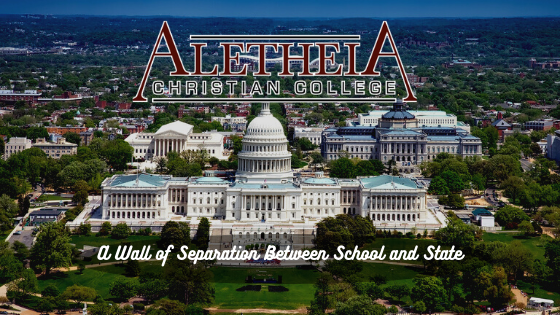The phrase, “a wall of separation” is often applied to the non-establishment clause in the US Constitution, Amendment 1. This phrase was coined by Thomas Jefferson who was writing to a Baptist association about the protections that the Constitution offered them against his own Anglicanism or the immensely powerful Puritan lobby in the New England states.
The first amendment reads as follows:
Congress shall make no law respecting an establishment of religion, or prohibiting the free exercise thereof; or abridging the freedom of speech, or of the press; or the right of the people peaceably to assemble, and to petition the government for a redress of grievances.
US Constitution, Amendment 1
While America has lawsuits over showing the ten commandments or a nativity scene, we rarely ever think about how this should apply to the biggest area of religious establishment in any country: the education system.
In The Third Education Revolution, Chapter 17, David Marshall discusses how the textbook History Alive paints Islam with a positive worldview while it “did not seem (so far as I found) to credit the Christian faith for a single positive development.” This textbook is used in public school systems. Historical analysis cannot be done without a religious worldview.
Similarly, scientific analysis has to have fundamental assumptions of truth and meaning in order to even begin the rigorous testing required of any scientific dialectic.
Education requires a fundamental worldview of worship.
What do you worship in your pursuit of Truth?
Aletheia does not accept tax dollars and we are lobbying for an end to taxpayer-supported education because education is the foundation for establishing a religion. Since we have created a wall of separation between church and state in the United States, we need to go one step further.
We need to apply the first amendment to our educational system, to build a wall of separation between school and state.
Whether you chose to put your kids in a humanistic school, a multi-religious school, a Christian school, a Muslim school, etc, that should be your choice, not the choice of powerful teachers’ unions backed by the support of hundreds of billions of tax dollars every year.
At Aletheia, we are unashamed to be a Christian community of learning. The idea that Truth is both subjective (in the person of Christ) and objective (being clearly seen through what God has made) is fundamental to our research and classes.
Our students do not have to agree with our worldview to graduate. But, they do understand what our worldview is before they come into our community of learning, our collegium.
We believe that every educational institution should be honest with the worldview that is fundamental to their study of truth, of meaning, of dialectics and research. For those countries who have a separation between religion and government, the logical next step is to move away from government schooling.
It is time to build a wall of separation between school and state.



excellent article
Amazing!! Great analysis!!!
I completely agree with all of this, however I do wonder about the wisdom of accepting students who aren’t part of His family. “What good is tuition in the hand of a fool who has no heart for wisdom?” (Proverbs 17:16). While I understand the heart behind wanting to do so, I believe it discourages the saints and works against those who are called to equip them. Wisdom seems to give this lesson to them for free: be saved and then be sanctified.
I intended to say *most, not all. My apologies.
Thank you for your comment Allison!
Regarding letting students in who are not part of His family, only God sees the heart. However, we require staff and faculty be aligned because we seek the agreement in principle of Amos 3:3. We do have requirements regarding actions because “Drive out the scoffer, and strife will leave, even quarreling and dishonor will cease.” (Proverbs 22:10)
A student does not need to agree on the destination he or she is going, the student only needs to agree to approach education with an open heart and mind.